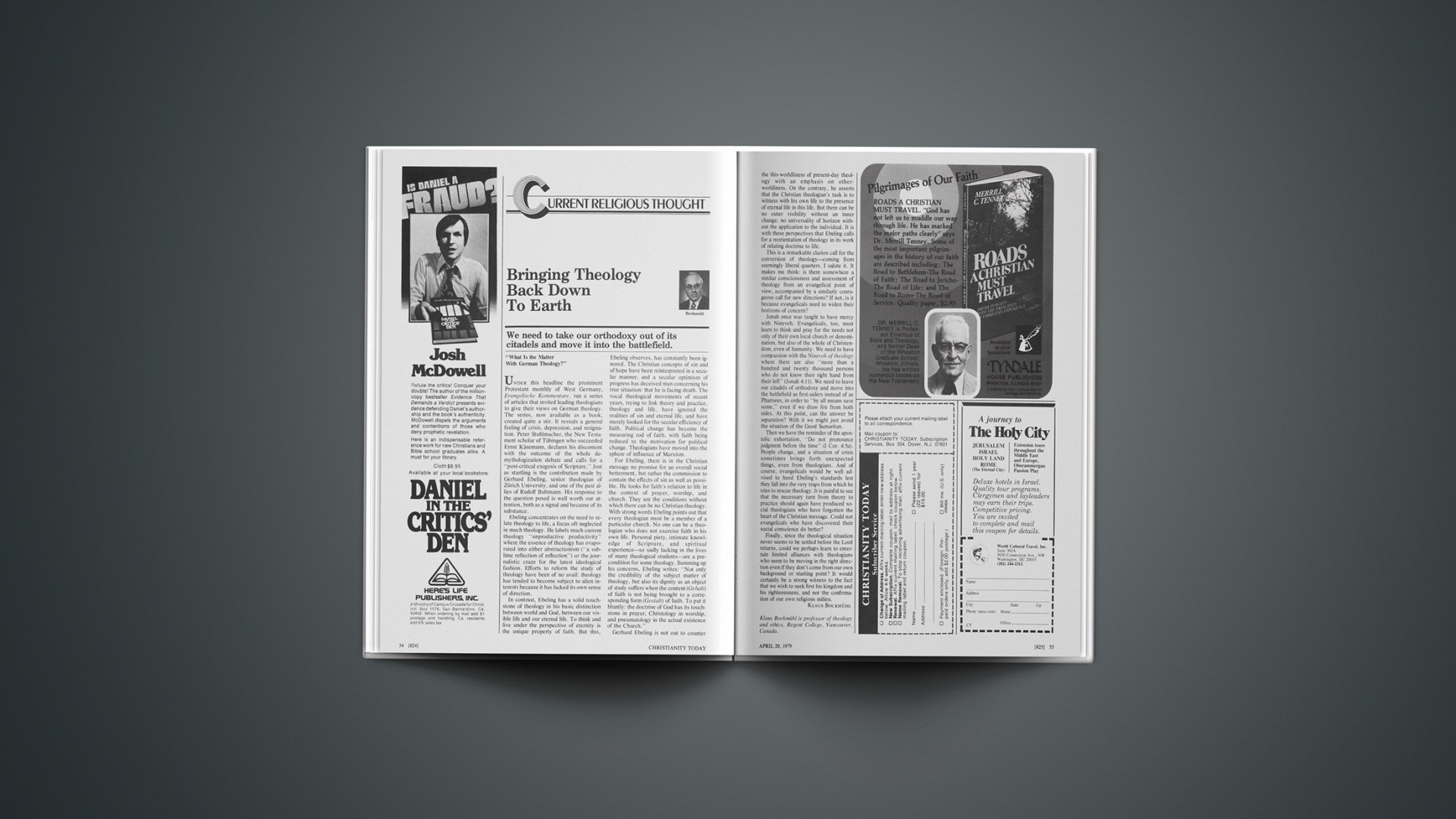“What Is the Matter With German Theology?”
Under this headline the prominent Protestant monthly of West Germany, Evangelische Kommentare, ran a series of articles that invited leading theologians to give their views on German theology. The series, now available as a book, created quite a stir. It reveals a general feeling of crisis, depression, and resignation. Peter Stuhlmacher, the New Testament scholar of Tübingen who succeeded Ernst Käsemann, declares his discontent with the outcome of the whole demythologization debate and calls for a “post-critical exegesis of Scripture.” Just as startling is the contribution made by Gerhard Ebeling, senior theologian of Zürich University, and one of the past allies of Rudolf Bultmann. His response to the question posed is well worth our attention, both as a signal and because of its substance.
Ebeling concentrates on the need to relate theology to life, a focus oft neglected in much theology. He labels much current theology “unproductive productivity” where the essence of theology has evaporated into either abstractionism (“a sublime reflection of reflection”) or the journalistic craze for the latest ideological fashion. Efforts to reform the study of theology have been of no avail: theology has tended to become subject to alien interests because it has lacked its own sense of direction.
In contrast, Ebeling has a solid touchstone of theology in his basic distinction between world and God, between our visible life and our eternal life. To think and live under the perspective of eternity is the unique property of faith. But this, Ebeling observes, has constantly been ignored. The Christian concepts of sin and of hope have been reinterpreted in a secular manner, and a secular optimism of progress has deceived man concerning his true situation: that he is facing death. The vocal theological movements of recent years, trying to link theory and practice, theology and life, have ignored the realities of sin and eternal life, and have merely looked for the secular efficiency of faith. Political change has become the measuring rod of faith, with faith being reduced to the motivation for political change. Theologians have moved into the sphere of influence of Marxism.
For Ebeling, there is in the Christian message no promise for an overall social betterment, but rather the commission to contain the effects of sin as well as possible. He looks for faith’s relation to life in the context of prayer, worship, and church. They are the conditions without which there can be no Christian theology. With strong words Ebeling points out that every theologian must be a member of a particular church. No one can be a theologian who does not exercise faith in his own life. Personal piety, intimate knowledge of Scripture, and spiritual experience—so sadly lacking in the lives of many theological students—are a precondition for some theology. Summing up his concerns, Ebeling writes: “Not only the credibility of the subject matter of theology, but also its dignity as an object of study suffers when the content (Gehalt) of faith is not being brought to a corresponding form (Gestalt) of faith. To put it bluntly: the doctrine of God has its touchstone in prayer, Christology in worship, and pneumatology in the actual existence of the Church.”
Gerhard Ebeling is not out to counter the this-worldliness of present-day theology with an emphasis on otherworldiness. On the contrary, he asserts that the Christian theologian’s task is to witness with his own life to the presence of eternal life in this life. But there can be no outer visibility without an inner change; no universality of horizon without the application to the individual. It is with these perspectives that Ebeling calls for a reorientation of theology in its work of relating doctrine to life.
This is a remarkable clarion call for the conversion of theology—coming from seemingly liberal quarters. I salute it. It makes me think: is there somewhere a similar consciousness and assessment of theology from an evangelical point of view, accompanied by a similarly courageous call for new directions? If not, is it because evangelicals need to widen their horizons of concern?
Jonah once was taught to have mercy with Nineveh. Evangelicals, too, must learn to think and pray for the needs not only of their own local church or denomination, but also of the whole of Christendom, even of humanity. We need to have compassion with the Nineveh of theology where there are also “more than a hundred and twenty thousand persons who do not know their right hand from their left” (Jonah 4:11). We need to leave our citadels of orthodoxy and move into the battlefield as first-aiders instead of as Pharisees, in order to “by all means save some,” even if we draw fire from both sides. At this point, can the answer be separation? With it we might just avoid the situation of the Good Samaritan.
Then we have the reminder of the apostolic exhortation, “Do not pronounce judgment before the time” (1 Cor. 4:5a). People change, and a situation of crisis sometimes brings forth unexpected things, even from theologians. And of course, evangelicals would be well advised to heed Ebeling’s standards lest they fall into the very traps from which he tries to rescue theology. It is painful to see that the necessary turn from theory to practice should again have produced social theologians who have forgotten the heart of the Christian message. Could not evangelicals who have discovered their social conscience do better?
Finally, since the theological situation never seems to be settled before the Lord returns, could we perhaps learn to entertain limited alliances with theologians who seem to be moving in the right direction even if they don’t come from our own background or starting point? It would certainly be a strong witness to the fact that we wish to seek first his kingdom and his righteousness, and not the confirmation of our own religious milieu.
Klaus Bockmühl is professor of theology and ethics, Regent College, Vancouver, Canada.










